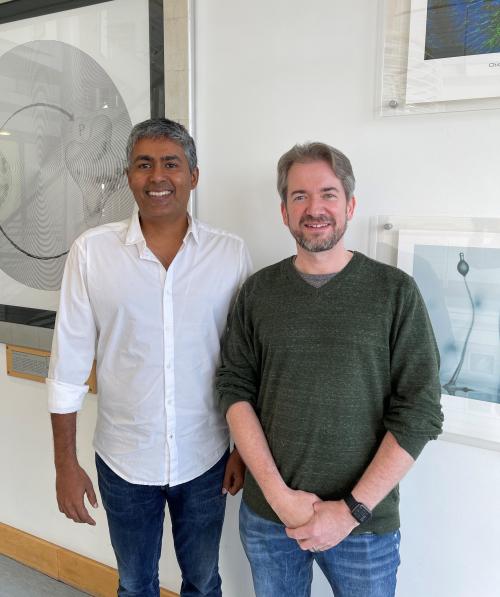
Nick Brewer, Ian Ganley, and Yogesh Kulathu have been promoted to Personal Chair (Professor) as part of the 2022 Annual Review process for academic staff.
Nick Brewer
Nick is a member of the D’Arcy Thompson Unit (DTU) and achieved his promotion in recognition of a significant body of work focussed on the student journey (widening access, retention and progression) and student experience for undergraduate students across the School and Wider University.
Initially, at School level, Nick in his role as Programme Lead for the Associate student, Widening Access and Foundation Year Programmes, worked with Further Education colleges to widen access to Higher Education for students both locally and internationally. As Nick has been involved in the development of the Life Sciences undergraduate curriculum over the last decade, including his time as School of Life Sciences Associate Dean for Learning and Teaching. This allowed him to create an innovative approach to curriculum mapping for Further Education student entry. Students were able to spend time at the University prior to entry to full time study on an undergraduate course. This work has led to a formal relationship between the University of Dundee and Dundee and Angus College. In addition, this approach has led to a significant increase in the progression and retention of students entering from Further Education colleges.
Nick’s work in this area was recognised and led to his appointment as the University Lead for Articulation from Further Education centres. Since 2016, several Schools across the University have adopted the strategy Nick initiated and more Further Education College articulations across the University are in the pipeline. Nick is keen to facilitate more relationships in the future. In 2020, Nick became the University Academic Lead for the International College Dundee (ICD). This important role allows him to build and reinforce relationships on behalf of the whole University and be the conduit between the University and Oxford International Education Group (OIEG) and help work with colleagues to establish new pathways. Nick views ICD as another widening participation route.
Nick said, “I am delighted and honoured to receive a Personal Chair from the University of Dundee. This would not have been possible without the support of colleagues in DTU, the wider School, University and most importantly, my family.
I feel honoured to be the first member of staff on a Teaching and Scholarship contract to be awarded a Personal Chair in SLS. Widening Participation is an area I have been passionate about for a long time and I have built upon previous successes. I am lucky to have a varied career to date, with Curriculum Design and Development and Programme Lead/Associate Dean: Learning and Teaching roles to now wider University Academic Lead positions.
The Personal Chair is very much a cumulative effort of the last 19 years work, but it doesn’t stop now as there is much more exciting and rewarding work to be done in the years ahead.
The School of Life Sciences and indeed the wider University of Dundee has been, and continues to be, an inspirational and exciting place to work and I look forward to what the rest of the decade, at the very least, has in store”.
Ian Ganley
Ian Ganley is a Programme Leader in the MRC Protein Phosphorylation and Ubiquitylation Unit. His research goal is to better understand the molecular mechanisms of autophagy, an intracellular quality control and recycling pathway that often goes awry in many diseases. Towards this endeavour, Ian’s lab has developed novel tools that have uniquely enabled visualisation of autophagy under physiological conditions. In particular, use of these tools has opened up the area of neuronal autophagy and has enabled Ian to demonstrate that this process is impaired in clinically relevant cells and tissues in relation to neurodegenerative disorders such as Parkinson’s disease.
Ian said “I am very honoured and of course delighted to receive a Personal Chair from the University. In reality, this is a reflection of all the hard work and dedication of my lab, both past and present, in trying to ask and understand difficult scientific questions. It also would not have been possible without excellent colleagues, collaborators and funders: it is a privilege to work in such a supportive and productive environment. These are exciting times for the lab as we now push forward in trying to understand how autophagy becomes dysregulated in disease and how we might alter it therapeutically.”
Yogesh Kulathu
Yogesh Kulathu is a Programme Leader and MRC Investigator at the MRC Protein Phosphorylation & Ubiquitylation Unit. The overall goal of his research is to understand the principles of how signal transduction is mediated by the posttranslational modification of proteins. His research has focussed on the ubiquitin system as the attachment of ubiquitin to proteins is fundamentally important for many cellular processes and essential for maintaining cellular homeostasis. The work in Yogesh’s lab has provided insights into how different ubiquitin signals are decoded in a cell, discovered new families of deubiquitinating enzymes (DUBs) and molecular mechanisms of how DUBs recognize substrate. His recent work has defined the molecular players and biochemical principles underlying modification of ribosomes with the ubiquitin-like-modifier, UFM1, advancing our understanding of how protein biogenesis at the endoplasmic reticulum is regulated.
Yogesh said “I am delighted with the award of a Personal Chair from the University of Dundee. This work would not have been possible without the incredible hard work of all the members of my team, past and present. I am greatly indebted to my mentors, colleagues, collaborators and family for their support. I am also immensely grateful to the funding bodies who have supported our work thus making it possible to tackle challenging problems and make new discoveries.”
More details of Yogesh’s research can be found here: https://www.kulathulab.org

